AMASCからの四旬節によせる省察
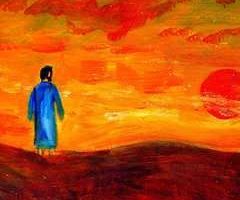 Ash Wednesday
Ash Wednesday
A symbol to remind us: we need to change
A sign to wake us: Easter is coming
A call for Urge us: Return to the Gospel!
A news: From the darkness of our ashes, can sprout life and party
An invitation: Let the fire of the Spirit cancel in us and in the whole humanity, all violence, all repression, all arrogance, all fear.
A convocation to “fasting”: stripping of so much useless baggage, making contact with our radical poverty
A horizon: To become builders of reconciliation and freedom, to share without calculating, to carry in the heart those who live deprived of what is necessary.
A certainty: Beyond the gloomy times, the word of Jesus promises: “Whoever loses his life for me will win it. “
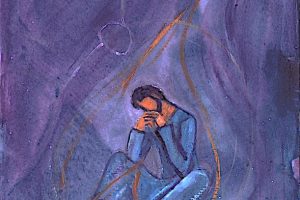 First Sunday of Lent
First Sunday of Lent
— “If you are the son of God, tell this stone to become bread.” (…) “I will give you the power and glory of all that (…) — “If you are the son of God, throw yourself down… Jesus answered: You won’t tempt the Lord, your God. (Lc 4, 1-13)
The Evangelist Lucas presents three places (the desert, the high and Jerusalem) in which Jesus faces the possibility of living his own vocation in the margin of obedience to God and His word. They are three places in which in their trajectory, in a repeated and intense way, their faith will be put to the test. But he did not absolutiza his own need or seek immediate gratification; It does not evade the limits of time and space of the human condition nor does it yield to the fascination of “everything” that comes before its eyes. It remains as an inhabitant of the boundaries, descendant of a wandering Aramaic because that is the condition that he has chosen to be done in everything like us, less in sin. His adherence to God is in continuity with the professions of faith of the first two readings: We are now the guests to profess ours and to recognize him as Lord whom the father has risen from the
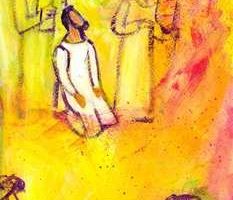 Second Sunday of Lent
Second Sunday of Lent
At that time, Jesus took Peter, John, and James to the top of a mountain to pray. And as he prayed, the appearance of his face changed, his garments gleamed with whites. Suddenly, two men chatted with him: they were Moses and Elijah, who appeared with glory; They were talking about his death, which he was going to consummate in Jerusalem. (…) A voice from the cloud said: “This is my son, the chosen one, listento him” (Lc 9,28-36)
The scene of the Transfiguration is full of contrasts: the law represented by Moses and the Prophetism incarnated in Elijah; The shining of light and the dark density of the cloud; A conversation about death and an experience of beauty that makes the disciples want to stay in that place; Jesus in brotherhood and again alone; A voice heard from the cloud and an end wrapped in silence. In the first part the visual predominates and the disciples contemplate a Jesus shrouded in light and meeting point of two emblematic characters of the history of Israel. In a second moment the visual disappears in favor of the voice and there is no more point of reference than the voice of the father that reveals his relationship with his son in terms of complacency and love. The scene no longer occurs before the disciples, now the luminous cloud envelops them and covers them as a tent. Those who at first were only spectators of the light of divine glory, no longer see but hear, the voice is addressed to them and the fear invades them. The order they receive is to listen to a voice that is not known in advance : they will have to trust in obedience, day by day, without knowing where it will take them or how they will find it.
At the beginning of Lent, an invitation to evoke moments of grace in which we have lived an experience of light and our life appeared as transfigured: Love became certainty, fraternity became palpable and all reality spoke to us a language New Hope and sense. They are momentary flashes that reveal the sense of the path of faith undertaken
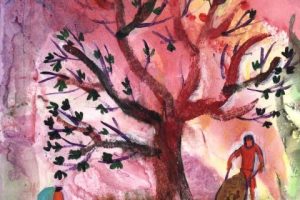 Third Sunday of Lent
Third Sunday of Lent
Jesus told them this parable:
A man had a fig tree planted in his vineyard, and went to look for fruit, but didn’t find one . Then said the vinedresser:” You see: I have been waiting for fruits since three years , and there is no one. Cut it off. Why will it occupy land in vain?”
But the vinedresser replied: “Lord, leave it one more year ; I will dig around and I will throw dung to it, to see if it will bear fruit. If not, you cut it “. (Lk 13, 1-9)
The parable of the fig tree reminds us that it does not belong to us to judge on the sterility or fecundity of the other and even less decide to extirpate or exclude those who do not produce according to our criteria. The lack of fecundity of the fig tree becomes for the vinedresser an invitation to work even more in his favour to obtain the conditions that allow him to bear fruit. To the temptation of hardening and exclusion, the vinedresser takes the side of a greater intensity of love and care and that love becomes work, commitment, dedication, committed trust in that hidden force of germination that each human being possesses. Jesus narrates the tenderness and patience of God, radical and absolute .The conversion that he proposes is to change our impatience and judgment in the patience that knows how to respect and wait for the time of others, offering them confidence and time to mature and . It is the same patience that God asked Moses to begin with his people through the long process of liberation. The same patience that He was going to practice Himself accompanying his people in their journey through the desert and giving them to drink a water of His Son
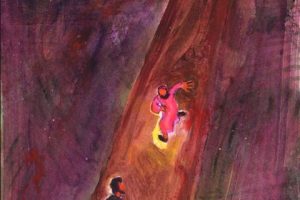 Fourth Sunday of Lent
Fourth Sunday of Lent
The youngest son, gathering all his belongings, emigrated to a distant country, and there he squandered his fortune. A terrible starvation spread in that land, and he was hungry… and no one fed him. Thinking back then, he said to himself: all my father’s workers have an abundance of bread, while here I am dying of hunger. I will go where my father is (…) When he was still far away, his father saw him and ran to meet him; and, running, he wrapped his arms around him and began to kiss him (…)Your brother was dead and has revived; he was lost, and we have found him »(Lc 15,1-3.11-32)
The parable reveals the human difficulty to recognize love and to welcome mercy. The two children, by different ways, appear incapable to accept, both their condition of children, and the tenderness of their father. Their sin is to ignore the parental love of which both are object and escape their status as children, one escaping from the house and the other living in it resentful and feeling enslaved. In the minor’s process, contact with his own interiority is decisive: it is not even a conversion, but rather an awareness of his disastrous situation. His sin, more than a dissolute and wasteful life, is foolishness, the blindness that prevents him from recognizing the love that surrounds him. His repentance is superficial and incomplete but the forgiveness he receives supplies everything, overflows everything, and he who was dead is reborn within that warm and nutritious space offered by his father’s love. The banquet in his honor is the celebration that, like Israel, he has entered his land again and lives in it the true reconciliation to which Paul refers.







